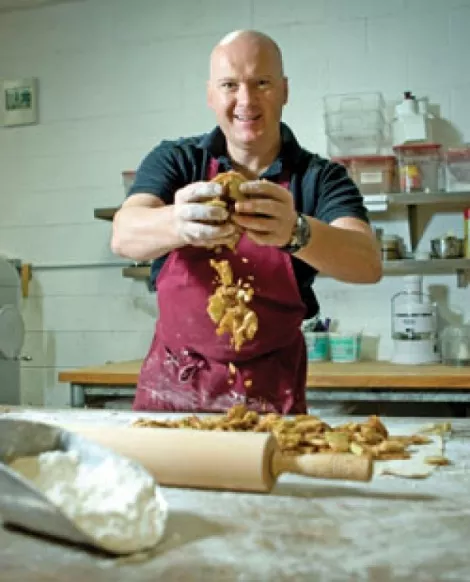
The average Englishman’s idea of the perfect dessert revolves around some archaic, stodgy pudding by the name of “spotted dick,” drowned in liquidy custard. But Perham, at least at first sight, seems far more European when it comes to the sweet.
Indeed Perham’s German chocolate cake, which he supplies to Salt Lake City’s downtown Siegfried’s Deli, had City Weekly food critic Ted Scheffler rating it the best one he’d ever had (without knowing that Perham was the baker). But when asked about Perham, Scheffler acknowledges he is “an excellent pastry chef. I’ve been known to follow his delivery van around town hoping that something I can eat will fall off.”
But Perham, like many self-effacing Brits, is loath to blow his own horn. He does zero advertising and marketing, and his current Website offers little by way of menus or testimonials. Perham, it seems, is all about word-of-mouth. A 17-year-resident of Salt Lake City, his client list—including the Utah Jazz, Mill Creek Inn and Jean Louis in Park City—speaks for itself. But how did this soft-spoken Englishman end up being one of the Beehive State’s top pastry makers?
A native of a small Bedfordshire village in northern England, Perham knew he wanted to be a pastry chef from the age of 14. “I loved the idea of being a famous pastry chef in a grand London hotel,” he says.
When Perham’s father got a job in San Jose, Calif., in 1980, the then-21-year-old Martin gave up his dreams of working in the London Savoy hotel and followed his family to America. Unemployment in London then, he says, was like the UB40 song “1 in 10.”
In 1990, he was hired by Little America in Salt Lake City. Utah took a little getting used to. When hotel clients asked for scones, he gave them the light, fluffy eats many ex-pat English folk crave, along with clotted cream and strawberry jam, as a taste of the old country. But Utahns turned up their noses. Scones in Utah, Perham learned, means deep-fried dough. Despite such confusion, Perham found a home here and opened up his own business, Quality Pastries.
Seven years later, he got married, but the demands of married life and pastry making, he says, did not sit well. “I burned out,” he says, and he sold the business to an employee. Eighteen months later, he gave up his daydream of opening a sushi bar and reopened as Martin’s Fine Desserts in 2001.
Desserts can be a profitable business. During the two-week Olympics, he made $40,000 worth of pastries and cakes. He also crashed his Audi and his wife’s car from the exhaustion of working 18-hour days seven days a week. Perham runs his business on his own, usually with a helper. And, while he doesn’t disclose financial figures, he is happy to reel off impressive production figures for the year: 50,000 fruit tarts, 250 sheets of brownies and 20,000 éclairs.
It all comes down to the ingredients, he says, which he imports from Europe. His almond-based marzipan is key to designs he mounts on his cakes. It’s a European touch that plays much better with out-of-state diners than locals, he says.
While acknowledging that pastries have their roots in French cuisine, Perham nevertheless seems to pursue his own particular blend of English and continental styles. Take the cake he made for his own wedding 10 years ago. Despite the fact that he has since divorced, reciting the cake’s ingredients—which were a compendium of his favorite tastes—still makes him smile.
“I made a chocolate hazelnut cake layered with black-currant jam and chocolate mousse, the spongecake soaked with Cabernet Sauvignon syrup,” he recalls. “It was amazing.” Black-currant jam, it might be added, is guaranteed to make the mouths of many Englishmen and -women water, as they enjoyed it as a staple of their childhood summer teas on bread and butter.
Given Perham’s penchant for detail and quality, expansion—at least for now—appears out of the question. He can’t afford to hire someone, he says, with his own level of talent. “It’s hard to train someone to do what I do,” he adds. “It’s not a cookie-cutter business.”
cw